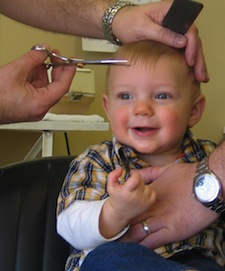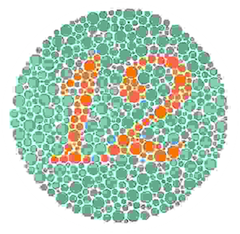10 Ways to Prepare for Your Child’s First Haircut
May 3, 2012 If your child is like most kids, he’s probably not going to be too keen on the idea of sitting still for a haircut, so you’ll need to make some preparations for that first haircut. We’ve collected some ideas that could come in handy to get you both ready to take the plunge. Here are ten ways to prepare for your child’s first haircut:
If your child is like most kids, he’s probably not going to be too keen on the idea of sitting still for a haircut, so you’ll need to make some preparations for that first haircut. We’ve collected some ideas that could come in handy to get you both ready to take the plunge. Here are ten ways to prepare for your child’s first haircut:
- Working up to the time when he gets his own haircut, your son could come along with Dad to watch him get his haircut. The ability to participate as a spectator, to a pleasant and painless experience will help ease the anxiety of getting his own haircut.
- Let your daughter sit in the stylist’s chair and pretend. Acclimating herself to the trappings of a real haircut will help her feel more at home when the big day arrives. Ideally, get her accustomed to the booster chair with a bib over her to maximize the realism.
- Practice at home with all the accoutrements of the real thing on hand: scissors, combs, spray bottle, etc. It’s a great opportunity to play pretend in a comfortable environment, while providing a dress rehearsal for her “opening night”.
- Talk with your child about what he’d like to do, or where he’d like to go to commemorate the special event. Focusing on what comes after the haircut will help take his mind off of the actual haircut, and get him into a more celebratory spirit.
- Schedule the haircut with someone who has experience working with toddlers. It will take patience and steady nerves on everyone’s part to make sure the experience is as pleasant as possible. Choose a kid-friendly location if that’s possible.
- Make sure she’s had a nap and been fed before heading out to the stylist. A well-rested and well-fed toddler is a lot more likely to hold still throughout the haircut, which would be a bad time for a cranky fit.
- Arrange to have some toys and treats handy, whatever comfort items you think will help keep your little one calm. We all like to cling to something familiar whenever we’re feeling anxious, so be sure you’ve got it handy when you arrive.
- Go through a book with your child to choose a cut you’ll both like. It’s good preparation and an excellent distraction from nerves. Get her excited about that beautiful new look she’ll soon have.
- Brush through your child’s hair before setting out to the appointment. The fewer tangles and less work that the hair-cutter will have to deal with, the less stress will be involved in getting the job done.
- If you’ve got an older child, you may want to schedule their haircuts together so that the younger can watch her older sibling get a haircut first. Point out how pampered she’ll be, just like big sis, when it’s her turn.
10 Educational TV Channels Kids Love
April 15, 2012 Parents can form a lot of concern about their kids watching too much television, and justifiably so when you see some of the shows that have made it on TV, but not all television shows are created equal. There are some good educational channels available for them to watch instead of the usual mindless cartoons. The visual medium of TV helps children to learn, and if done in an entertaining way, they can even enjoy it. For a lot of kids it’s much more fun to watch a historical movie than to read a history book. And thanks to cable and satellite networks there are now several great channels to choose from when clicking through looking for an entertaining show. Here are 10 educational channels on TV that kids love to watch.
Parents can form a lot of concern about their kids watching too much television, and justifiably so when you see some of the shows that have made it on TV, but not all television shows are created equal. There are some good educational channels available for them to watch instead of the usual mindless cartoons. The visual medium of TV helps children to learn, and if done in an entertaining way, they can even enjoy it. For a lot of kids it’s much more fun to watch a historical movie than to read a history book. And thanks to cable and satellite networks there are now several great channels to choose from when clicking through looking for an entertaining show. Here are 10 educational channels on TV that kids love to watch.
- Discovery – One of the first channels to make education fun for kids, the Discovery Channel is a fantastic resource for educational and entertaining TV. Shows like Mythbusters, How its Made, Planet Earth and Dinosaur Revolution are good examples of how TV can make learning fun for children.
- Animal Planet – An offshoot of the Discovery Channel, Animal Planet is an informative channel geared toward covering everything about animals. Kids who love to watch shows about critters are going to naturally gravitate to this channel.
- Science Channel – For kids who love science or need some help getting interested, the Science channel is great place to start. Just about every show is appropriate for school age children and can inspire them to get hooked on science.
- History Channel – Have kids that think history is boring? If you need help getting your kids to show more interest in history, the History channel is where you should turn. Most of the programming can make learning history interesting and cool plus kids can also learn about things like logging, science and geography.
- Nickelodeon – Kids love the shows on Nickelodeon for purely entertainment purposes, but parents know they’re educational too. Children are having so much fun they don’t even realize they are learning stuff at the same time.
- Nick Jr. – Geared toward preschoolers, Nick Jr. has even more educational value packaged in a way kids love. Shows like Moose and Zee, Wow Wow Wubbzy, Oobi and Little Bear all are all specially geared toward early learning.
- The Learning Channel – How clever for them to use the acronym TLC so kids may not realize they’re watching educational TV. The Learning Channel brought us great shows like Junkyard Wars where teams made cool stuff from junk, and more recently Little People, Big World where children can really identify with the vertically challenged adults.
- Disney Channel – The main purpose of the Disney Channel is to entertain while educating. Kids love the shows, movies and mini series while learning life’s valuable lessons.
- PBS – Home of Sesame Street, The Electric Company, Mr. Roger’s Neighborhood and Barney & Friends, PBS was the original educational television channel for kids. Generations of children have loved watching their programming that pioneered this genre.
- Sprout – PBS has launched its own channel just for kids called Sprout. Marketed at preschoolers and their families, kids can get the interesting education they love all day long until the Goodnight Show comes on and it’s time for bed.
With so much garbage on television, it’s good for parents to know that there are a multitude of educational channels for kids of all ages. Programming on some educational channels is geared more for adults, so parental discretion would be advised, and there are definitely some shows that are not appropriate for young children. With proper supervision, however, there are plenty of good educational TV shows for kids to love.
Posted in Nannies | 1 Comment10 Early Signs Your Child May Have a Learning Disorder
April 12, 2012 In most cases learning disabilities won’t be identified in children until after they’ve been attending school for several years. Even then, the indications aren’t always obvious and consequently don’t present themselves clearly apart from formal training. Nevertheless there are some signs that parents can look for if they suspect that their child does indeed suffer from a learning disorder. Here is a list of ten such signs:
In most cases learning disabilities won’t be identified in children until after they’ve been attending school for several years. Even then, the indications aren’t always obvious and consequently don’t present themselves clearly apart from formal training. Nevertheless there are some signs that parents can look for if they suspect that their child does indeed suffer from a learning disorder. Here is a list of ten such signs:
- Family History – For starters, a parent can identify risk based on heredity. Has there been a history of learning disabilities or congenital diseases which can lead or contribute to a learning disability?
- Substance Abuse by Parents – If either of the parents has had in the past or currently has a substance abuse problem, there is a higher risk of a learning disability in the child, particularly if the mother’s abuse continued through her pregnancy.
- Motor Skills – If a child shows slow development of gross motor skills (such as walking or standing), or small motor skills (like toes or fingers), this can be a precursor to a learning disability. Watch for these indicators during the first 6 months, particularly in combination with other developmental delays such as …
- Cognitive Skills – A child’s ability to recognize faces and retain information, such as repeating a phrase that he or she may have learned once already. An inability to learn skills typical for the child’s age may suggest an LD.
- Speech/Language – A child may display some difficulty expressing herself, or have a hard time understanding or recognizing letters or numbers. A doctor exam can isolate many of these cognitive difficulties and eliminate other possibilities such as hearing or vision problems.
- Poor Concentration – Although it is a separate issue entirely, ADD often is accompanied by a learning disorder and must be diagnosed separately. Yet a child who is dealing with a learning disability will frequently become distracted out of frustration.
- Delayed Speech – On the one hand, the child may begin speaking at a later age than should be expected; then there is delayed or faltering speech, in which the child struggles with correct pronunciation and the ability to express a thought clearly.
- Poor Retention – The child, for instance, may be able to follow along with a bedtime fairy tale reading quite well, but then not be able to discuss it in much depth afterward. Inability to recall information that was recently taught or shared is another potential warning sign.
- Difficulty Following Direction – A child with an LD might not be able to take simple instructions to complete a task. Bear in mind that most children with an LD have average or above average IQ’s, but simply lack the ability to readily apply it for some reason.
- Reading Comprehension – It is often difficult for a child with a learning disability to discern words, characters or be able to read effectively. Depending on the age of the child and the amount of schooling he’s received, reading ability can be a determining sign of an LD.
It’s important to point out that no one indicator is definitive proof that a child is suffering from a learning disorder. There are any number of other possibilities to consider as well. Only through careful observation and professional examination can a child be accurately diagnosed with a learning disability.
Posted in Nannies | Comments Off on 10 Early Signs Your Child May Have a Learning Disorder10 Common Reasons a Family Profile Might Get No Responses
April 3, 2012 If you’ve posted a profile online at a nanny website and aren’t getting a lot of responses it could be due to any of a number of reasons. Gaining the attention and interest of qualified potential candidates takes some know-how and creativity, but there also may be some factors that just don’t suit otherwise motivated applicants. Here are ten common reasons why a family profile might get no responses:
If you’ve posted a profile online at a nanny website and aren’t getting a lot of responses it could be due to any of a number of reasons. Gaining the attention and interest of qualified potential candidates takes some know-how and creativity, but there also may be some factors that just don’t suit otherwise motivated applicants. Here are ten common reasons why a family profile might get no responses:
- Too Many Kids – There isn’t much you can do about this one. If you need a nanny to care for more than 3 children expect a longer search and higher salary expectations. There just are not a high number of nannies that will respond to profiles of very large families.
- Not Enough Pay – Whether it’s because of the number of children needing care, special requirements, or just the market, the salary listed may not be in keeping with expectations. You may want to either reassess your salary offer or save that for the interview.
- Location – Some areas are more attractive for job seekers or have a higher number of qualified candidates available than other areas. If you have difficulty finding an adequate number of candidates consider broadening your search or offering more incentives.
- Poorly Written – A good profile should be concise, explain the job clearly, and generate as wide an interest as possible. If it’s difficult to read or the job isn’t well-defined this could be a turn-off. Candidates need clear and sufficient info about the job before responding to it.
- Too Much Yin, Not Enough Yang – The yin and yang of job profiles is a proper balance between your expectations and the candidate’s expectations. A long list of demands with little mention of benefits or compensation won’t get a lot of responses.
- Unorthodox Job Description – If your nanny is going to have to cook, clean, entertain guests and do oil changes, you are going to be limiting the number of applicants. Any requirements above and beyond the traditional role of nanny are going to further complicate your search.
- Low Traffic Site – Not all nanny websites are created equally. The site where your profile is posted should be highly ranked, reputable, and attract quality candidates. That leads to the next potential snag …
- Disreputable Site – Do some research before placing your ads for a nanny. Investigate the site’s reputation and policies to determine how qualified the candidates will be whom you’re likely to find searching for work there.
- Contact Information – Proof-read your profile to make sure it contains current and accurate contact info including phone numbers and email addresses. If you are only available to take calls at certain hours, state them clearly.
- Spam Filter – If you have listed an email address for applicants to send their responses, make sure that your email server hasn’t been inadvertently sending them to a spam folder.
There are many reasons you may not get a response right away, but be patient. Finding the perfect nanny might take a while, but it will be time well spent in the long run. Take your time, look around, and make sure your expectations are clear.
Posted in Nannies | Comments Off on 10 Common Reasons a Family Profile Might Get No Responses10 Most Often Misdiagnosed Kids Ailments by Parents
March 27, 2012 One of the roles we play as parents on occasion is that of family physician. Recognizing and treating minor ailments and then deciding whether a doctor visit might be in order is all in a day’s work for most moms and dads. That’s not to say our diagnoses are always right; we do get it wrong on occasion too, and here are some common illnesses and ailments that trip us up. The following is a list of the 10 most misdiagnosed kids’ ailments by parents:
One of the roles we play as parents on occasion is that of family physician. Recognizing and treating minor ailments and then deciding whether a doctor visit might be in order is all in a day’s work for most moms and dads. That’s not to say our diagnoses are always right; we do get it wrong on occasion too, and here are some common illnesses and ailments that trip us up. The following is a list of the 10 most misdiagnosed kids’ ailments by parents:
- ADHD – Parents will often interpret the signs of this disease as being indicative of a disruptive or unruly child. It is necessary to conduct testing to ascertain that the child is indeed suffering from Attention Deficit Hyperactivity Disorder.
- Asperger’s Syndrome – Parents of children with Asperger’s Syndrome will frequently confuse the symptoms with autism. Naturally, either case requires a professional diagnosis, but initial tendency is for parents to lean towards their child having autism unless proven otherwise.
- Bacterial Meningitis – Sharing many of the same symptoms of the flu such as fever and headaches, bacterial meningitis is often mistaken for the more common flu. Light sensitivity, seizures and skin rashes may also accompany those symptoms.
- Vocal Cord Dysfunction (VCD) –This illness is characterized by sudden, abnormal narrowing of the vocal cords, which results in obstructed airflow and a wheezing sound during breathing. This is frequently misdiagnosed by parents and doctors alike as asthma.
- Food Allergies – Because reactions can vary so widely, depending on the types of allergy and food, children with food allergies are frequently misdiagnosed with other ailments. It can be difficult at first to narrow down the cause to a specific food group.
- Vomiting – As a general symptom with so many possible causes, parents cannot be certain what their child is ailing from without additional information or an examination. It could be caused by anything from upset stomach to colic, to intestinal malrotation.
- Psoriasis – This condition can cause skin to break out in a rash on the patient, and as such is often misdiagnosed initially as simple acne. Particularly because acne is such a common issue among children, it’s so often considered the cause of this skin reaction before something like psoriasis is considered.
- Mononucleosis – Mono infections typically are accompanied by flu-like symptoms. Parents often assume that to be the culprit prior to a doctor examination. Mononucleosis is usually caused by the Epstein-Barr Virus (EBV).
- Common Cold – There’s a reason it’s called the common cold, and children will suffer from a cold quite readily. Also, colds can last for a long time, so other possible causes aren’t generally considered right away.
- Mental Illness – Children can be rambunctious, ornery, ill-tempered or very difficult naturally, and for any number of reasons – from soiled diapers to just plain crankiness. So it’s not uncommon for children who habitually exhibit these traits to be misdiagnosed before more serious root causes are considered.
10 Lessons Learned from Classic Disney Movies
March 20, 2012 For the most part Disney movies are fun to watch and kids really love them. If one takes the time to look under the surface, however, one will find some valuable life lessons to be learned from these movies. Parents can help their children glean priceless nuggets of wisdom if they take the time to go a little deeper in the story and discuss the life lessons imbedded within. To get you started, here are a few lessons from some of the Disney classics.
For the most part Disney movies are fun to watch and kids really love them. If one takes the time to look under the surface, however, one will find some valuable life lessons to be learned from these movies. Parents can help their children glean priceless nuggets of wisdom if they take the time to go a little deeper in the story and discuss the life lessons imbedded within. To get you started, here are a few lessons from some of the Disney classics.
- Snow White – There are many lessons to be learned through this movie. There is the work ethic of the dwarves and there is the help that Snow White provides for them without being asked. She sees a job that needs to be done and she does it. There is a lot to be said for a person who, out of the kindness of their heart, steps in and helps out.
- Cinderella – Everybody wishes they had a fairy godmother to make their tough situations go away. But the lesson to be learned here is that one can continue on and keep a positive attitude despite adversity. Cinderella could have chosen to be a whiner or have a negative attitude. She had plenty of reason to do both. Yet she was obedient, and regardless of the situation, she kept a positive attitude.
- Mary Poppins – Such a joyful and colorful movie with a good message about work. Work can be enjoyable. It doesn’t have to be drudgery or painful. And the other message that parents may want to take away is that it is good to take time to enjoy your family. Understanding each other is a key to having a loving relationship with each other.
- Beauty and the Beast – At least two lessons can be learned from this movie. One is about sacrifice. Beauty gave up everything in order to save her father’s life. She loved her father so much that she was willing to live in isolation with a terrible monster so that he could be free. Then with the beast, we see a person with anger management issues. We also see that with patience and understanding on Beauty’s part, he was slowly able to get his emotions under control.
- Mulan – Here is a story of courage and perseverance. The lesson here is about following your heart and believing in yourself. There are many stories about girls who knew they had a job to do but had to disguise themselves as males in order to get the job done. Throughout history this has been the case. Mulan could be a wonderful jumping off place for you to have a talk with your daughter about her dreams and aspirations. You can persuade her to have the courage to go forward with determination to achieve her goals.
- The Lion King – Children need to learn that their actions have consequences. A lot happened when Simba disobeyed his parents. In the end it all turns out okay, but look at all that transpired in the meantime. This is a good movie to use for talking about responsibility and consequences.
- Pinocchio – Dear, sweet, little wooden puppet that he is; he teaches a lot about honesty and how much trouble you can get into if you aren’t honest. This movie also teaches children to look beyond the now and see what effects their decisions may have on their future.
- Pocahontas – In this age of information and disposable everything, it’s difficult to appreciate the Earth as a resource and an entity deserving of respect and care. This movie teaches the importance of respecting the earth. Consider watching it around Earth Day, then take the kids out and volunteer to do something to drive the point home.
- The Fox and the Hound – There is a difficult lesson to learn from this movie, but it is an important one; it is the lesson about the price of prejudice. Two pups start off as friends, but because they are different and the world says they are supposed to be mortal enemies, their friendship comes to a halt. It doesn’t necessarily have to be that way, but it plays out in real life time and time again. It’s worth discussing the possibility of what would have been different if they had decided to remain friends despite the pressure against them.
- Aladdin – This movie has many lessons also, but one of the major themes is about keeping your word. Aladdin tells the genie that he will save one of his wishes to free the genie; when that time comes, there is a difficult choice to make. Aladdin can either free the genie or use the wish to make his own life comfortable. He chooses to honor his original promise and let the genie go. Wouldn’t it be nice if everyone who made promises to do something good for others actually followed through with those promises?
Movie night with the kids can be a lot of fun with pizza and popcorn. It’s wonderful to get the family together for some quality time; you can make it even more special by going a little deeper with your kids. You will help them develop their critical thinking skills, and you will be surprised at the things they begin to notice when they watch movies. There are many good lessons to be learned in the world of the cinema both from a positive and negative perspective. Teach you kids to be truly enriched by the movies they watch.
If you found this interesting, we highly recommend that you take a look at how you can use cartoons to help teach your child new lessons and even some core values.
Posted in Nannies | 1 Comment10 Reasons Kids Prefer One Parent Over the Other
March 13, 2012 As a parent you can’t have a favorite child, it just wouldn’t be right. You love both of your children equally, but there are days when I tell my kids that I don’t like how they are acting very much. When you’re a kid it’s probably similar in that they love both of their parents, but they may like the way one parent interacts with them more than the other. And in my personal experience that seems to change as the child gets older.
As a parent you can’t have a favorite child, it just wouldn’t be right. You love both of your children equally, but there are days when I tell my kids that I don’t like how they are acting very much. When you’re a kid it’s probably similar in that they love both of their parents, but they may like the way one parent interacts with them more than the other. And in my personal experience that seems to change as the child gets older.
- Spends more time with mom: When kids are little and the mom stays home with them then they are more likely to favor mom over dad. Mom feeds them and changes them while dad is out working and is home for far less time than mom. Although my kids were always thrilled when my husband came home and would run to him with a big hug.
- Dad does sports with them: While mom can do sports too and mom often is the one who shuttles them to practices, when they get older it seems to be dad who is rough and tumble with them and not mom.
- Mom’s hugs and kisses are better: This depends on the dad, but more often than not the mom is very loving with lots of hugs and kisses and shows affection more to the kids. Then when the kids get older they will rebel against that and say they are too old for mom to do that and she’s treating them like a baby.
- Dad can play horsey with them: Dad is usually bigger and stronger and can give them pony rides on his shoulders and throw them around. Mom can do that when they are little, but as they get heavier it’s harder to do without hurting mom.
- Similar activities with mom: Mom takes her daughter shopping, to get her hair cut, and to get a pedicure. It’s mom who will show her daughter how to wear make-up and earrings. These special things will come as your daughter gets older and she’s less of a daddy’s girl.
- Dad is a better defender: If your child is being bullied at school it’s going to be dad who’s going to show the son how to defend himself and dad may show his daughter a few things too. Dad will always be there to protect them from the bad stuff.
- Mom is their biggest cheerleader: Who is it that is at almost every game cheering the loudest for them? Who comforts them when they lose a game? Who believes they are the best no matter what? Mom, that’s who. When a kid makes it to the big time and he’s saying his thank you’s who does he thank, mom. When they get the chance to get on television and they wave, who do they say hi to, mom.
- Dad treats them like they are more grown up: Sometimes it’s hard for mom to let her kids grow up. I tell my son that he will always be my baby no matter how old he gets. Instead of getting upset about it he has embraced that and will often throw my words back at me when I tell him to grow up. Dad on the other hand will let the kids have more freedom and not keep such a tight rein on them. Dads tend to feel like its okay if a kid gets hurt and that it’s all a part of growing up.
- Mom is calmer than dad: This will depend on the dad, but often dads are louder than moms and when they get angry they yell more than mom. When dad yells that could be scary for a child and they will run to the mom for comfort. This can be reversed if the mom is the yeller and the dad is really laid back.
- Dad lets them get away with everything: Mom is with them 24/7 and dad is at work. When dad gets home it’s time to have fun and go play. If mom is gone dad takes them out to eat instead of cooking them healthy food like mom does. They want to go to their friend’s house; dad lets them as he doesn’t know any reason why they can’t go. Sometimes dads aren’t in the loop on the day to day stuff the way moms are so they make up for it by doing fun things.
Posted in Nannies | 1 Comment
10 Reasons Strong Discipline is Important for Kids
March 4, 2012 To be clear when I refer to strong discipline I do not mean any type of corporal punishment. Kids when I was growing up could be disciplined by any adult that saw them doing something wrong. If you were bad at school you were sent to the principal to get a spanking. And they usually used a paddle to do the spanking. If your neighbor saw you and your brother fighting outside they could come and grab you both by the ear and give you a stern talking to. Times have changed and it has gone in the opposite direction. Now parents are afraid to punish their child for fear someone will turn them in for abuse. A teacher wouldn’t dare lay a finger on your child for fear you’d sue them. Kids are getting away with everything these days and we’re not doing them any favors by letting them run roughshod over us. Check out 10 reasons strong discipline is important for kids.
To be clear when I refer to strong discipline I do not mean any type of corporal punishment. Kids when I was growing up could be disciplined by any adult that saw them doing something wrong. If you were bad at school you were sent to the principal to get a spanking. And they usually used a paddle to do the spanking. If your neighbor saw you and your brother fighting outside they could come and grab you both by the ear and give you a stern talking to. Times have changed and it has gone in the opposite direction. Now parents are afraid to punish their child for fear someone will turn them in for abuse. A teacher wouldn’t dare lay a finger on your child for fear you’d sue them. Kids are getting away with everything these days and we’re not doing them any favors by letting them run roughshod over us. Check out 10 reasons strong discipline is important for kids.
- Kids need limits: It’s part of growing up to push the limits. If there are no limits to push then the kid just goes crazy. While the child may not realize that they need limits they do. They need to know what time they are supposed to be home. When they are supposed to go to bed. How much they should be snacking. Without limits kids are just adrift.
- Disciplined kids grow up to do better in school: There will be certain expectations put on your child when they go to school. If your child has had little to no discipline at home then it will come as quite a shock to them when they are expected to sit in a room and learn all day. Kids that already know discipline will be better able to adapt and they will do better in school.
- It lets them know you care: If you are too busy doing your own thing to discipline your child what makes you think they will have any respect for you? Will they feel like you don’t care about them because you can’t be bothered to show up and act like a parent. If disciplining is done in a positive loving manner kids will know that you care about them when you discipline.
- Allows kids to know they have control over their actions: When there are limits set and consequences for their actions then kids will have the tools to make decisions that affect their lives. They will have control over whether they get in trouble or not. When you discipline it’s important to be consistent so kids can count on what will happen if they do something wrong.
- Teaches cause and effect: When kids know that there will be consequences for their actions this teaches them that they decide what happens. If they don’t do their homework then they will lose privileges to play with their friends or to play on the computer. They choose their behavior and therefore they choose their punishment.
- Responsibility: Kids will be more responsible if there are clear expectations. When you let your child know how you expect them to behave then that is passing along wisdom from you. Knowing how to follow the rules will make them more responsible adults.
- Accountability: When your child is held accountable for their actions then that makes them be more accountable in life. If you aren’t giving 100% on the soccer field and you find yourself on the bench you will learn that you need to be accountable to yourself and to your team. If not, then you will find yourself sitting out of the fun.
- Sets boundaries: All discipline sets boundaries of what kids should and should not do. Should you hit your sister in the head with a bat because she said something that made you mad? No, and if you do you will be punished. If something was said then it needs to be discussed in a cool and rational manner. No violence needs to ensue. You do not go into the street because you could get run over. Boundaries can be physical, monetary or emotional. If you set boundaries for them they will be able to set them for themselves in the future.
- Mutual respect: If you are clear in what you expect from your child and you are clear about what the penalty will be for not obeying then you are showing respect for your child. That child will also respect you in the long run.
- Strong moral compass: Your child will develop a strong moral compass as long as you share your morals with them. Let them know what is right and wrong. How you expect them to act and behave. When they know that and then do it they will develop character and strong morals.
Posted in Nannies | 1 Comment
10 Signs Your Child May be Color Blind
February 26, 2012 When someone is color blind it doesn’t mean that they see no colors. It’s not like they see everything in shades of gray except in very rare instances. Being color blind means that you have trouble seeing red, green, yellow, blue or some combination of these. Red/green color blindness is most common. Color blindness is often inherited so if you are color blind then it is very important that you have your child checked as early as possible. Being color blind can affect the way a child learns to read. Check out 10 signs your child may be color blind to see if you think your child may need to be tested.
When someone is color blind it doesn’t mean that they see no colors. It’s not like they see everything in shades of gray except in very rare instances. Being color blind means that you have trouble seeing red, green, yellow, blue or some combination of these. Red/green color blindness is most common. Color blindness is often inherited so if you are color blind then it is very important that you have your child checked as early as possible. Being color blind can affect the way a child learns to read. Check out 10 signs your child may be color blind to see if you think your child may need to be tested.
- Struggles with color games: When kids are little, parents often play games with them where they tell them to pick up the red ball. At the beginning kids are just learning their colors and if they don’t pick up the red ball all the time it doesn’t mean that they are color blind. If time goes on and they can easily pick up the yellow and blue balls, but struggle with the red and green ones you might make a note.
- Can’t point out certain colors: Another thing parents do when kids are little and they are trying to teach them their colors is to ask their child to point to the pink pony. It may be that the child can’t tell the difference between the light pink pony and the yellow pony. Continue to ask these questions, but make a point to follow their progress with certain colors.
- Can’t match their clothes: This one is harder to tell because some kids just like to dress in wild and crazy clothes, but if you ask your child to put on their red T-shirt with some jeans and they come back with another color be sure to ask them why they didn’t grab the red shirt. More often than not it will be because they couldn’t find it. Show it to them and see what color they think it is.
- Can’t tell which light is glowing on a stoplight: When in the car you can work on colors and safety issues by asking what color light is shining right now on the stoplight? If the child doesn’t know you can tell them, but if it becomes a pattern that they can’t tell the green light from the red light you may need to get them checked.
- Have trouble finding patterns: Kids books will sometimes have patterns. If the patterns are made up of green and red a child who is green/red color blind won’t be able to see the pattern. Unless the colors are different shades. Then it would be like the shades of gray thing.
- See no difference in light green and dark green: Another sign that your child may be color blind is if you ask them about different shades of a color. If you ask a child to get their light green sweater because it matches that outfit and they come back with a different sweater it may be that they can’t tell the difference between light and dark green.
- Browns, blues and blacks get mixed up: This is a very common issue for color blind people. They can’t tell the difference between dark blue, dark brown and black. While they don’t all look the same they may look similar to each other enough that they can’t distinguish which is which. While it’s uncommon for girls to be color blind it does happen. If you asked your daughter to put on her black skirt and red top to go to school she may come out with a brown skirt and pink top. Don’t just chalk this up to her taste in clothes. She may not have been able to tell.
- You find yourself correcting them on colors a lot: Children tend to talk a lot and may be running around touching things in a store and say isn’t this a pretty pink shirt and its yellow. Once or twice making a correction is nothing to worry about, but if you find yourself correcting them on colors a lot you may need to get them checked.
- They complain about glaring light: Color blindness is caused by missing cones in the eye. For some reason children can see better when there isn’t a glare on the page. Most kids won’t complain about lighting so if you hear your child complaining about lighting you may need to have them checked.
- When they use crayons they stay away from certain colors: While this may also just be whim take note if your child stays away from certain colors all the time. Like they never use brown for trees or green on leaves. Apples are not red they are some other color. This may just be your child being creative and that’s great, but if it’s not then you might have a color blind child.
10 Reasons Moms Might Run Away from Home
February 24, 2012 A recent article in a national magazine had everyone buzzing as it detailed the story of a mom who left her family behind. People wonder how it could ever be possible for a mother to leave her children. Fathers are known to walk out but mothers don’t have that reputation. However, there does seem to be a growing trend for moms to walk away even though it is still rare. Here, we look at a few causes as to why that may happen.
A recent article in a national magazine had everyone buzzing as it detailed the story of a mom who left her family behind. People wonder how it could ever be possible for a mother to leave her children. Fathers are known to walk out but mothers don’t have that reputation. However, there does seem to be a growing trend for moms to walk away even though it is still rare. Here, we look at a few causes as to why that may happen.
- Too much responsibility – There is the chance that some women feel too overwhelmed with the responsibility that being wife and mother entail. The expectations of motherhood and being a perfect wife can get pretty high and this can cause enough stress to make a mom want to leave it all behind.
- Lack of commitment – Not everyone who makes a family is committed to it. Just as fathers can lack a feeling of commitment to their families, mothers can feel the same way. The difference is that now more mothers are beginning to act on those feelings.
- Fear of parenting – Raising a child can be a daunting task in the best situations. If you have a child with special needs or hyper activity the stakes are raised even higher. Some mothers are afraid that they might not be up to the task of doing a good job so rather than tough it out, they leave.
- Desire to pursue other goals – Sometimes the greener pastures’ call is so loud that it can’t be resisted. For some, being offered the dream job or once in a life time opportunity and having to leave your family behind to do so is just too good to give up.
- Knowing that Dad is a better parent – There are some women who give up parenting. They just can’t handle it and they know that the children will do well and be nurtured and cared for sufficiently by Dad.
- Emotionally overwhelmed – Postpartum blues can cause women to do things that don’t make any sense at all. This kind of depression can have devastating effects upon the family. Feeling emotionally overwhelmed can bring anyone down, but if a person is dealing with chemical or hormonal imbalances it only exacerbates the problem.
- Finances – For some women who are experiencing serious financial difficulties, they may leave their children with the belief that they will have better life in the care of someone else. This is often true of mothers in third-world countries who abandon their children at orphanages.
- Personal problems – Some mothers have serious personal problems that they need to work on and they may feel that they cannot manage to do that in the family setting. Gambling, drugs, and other addictions are a few examples.
- For love – Unfortunately, in some cases, mothers have been known to walk away from their families in order to go off with a man. This, of course, has a devastating affect on children who can’t comprehend why she would love them less than this person who, to them, is a stranger.
- It’s the right thing to do – There are women who know their limitations and being an effective parent is just not within their reach. Women who have violent tempers know that they may hurt their children under certain circumstances. They may actually walk away out of love for the children.
It’s really unfortunate that any parent would leave the family, but motherhood has traditionally been such an honored position that the thought of a mother leaving her children is unimaginable. And yet, the mores of society are changing so that more women are beginning to search beyond the family bounds for their fulfillment. Mothers who believe they can’t handle family life are running away, rather than trying to find the support they need to effectively parent their children.
Posted in Nannies | Comments Off on 10 Reasons Moms Might Run Away from Home ← Older posts Newer posts →DIY & Sign up Online
We have partnered with eNannySource to help you search for the perfect nanny in your area in addition to our other services.
Enter your zipcode to get started:
Nanny Articles
- How to Calm Back to School Jitters
- What to Include in Your Nanny’s Annual Review
- 25 Blogs Featuring the Most Inspiring Parenting Stories
- Crazy Things Kids Say About Old People
- 21 Blogs with Insightful Tips for Helping Kids Through a Move
- Is Lying to Your Kids About the Tooth Fairy Wrong?
- 21 Blogs Making Fun Homemade Mixtures for the Kids to Get Their Hands Into
- 10 of the Most Hated Cartoon Characters by Moms of All Time
- How to Hide Electrical Wires from Computers, TVs and Small Appliances
- 30 Blogs with the Best Tips on Helping Your Child Prepare for Standardized Testing
National Nannies History
- Pillow Agreement Definition
- Retroactive Caregiver Agreement
- What Is Condition and Warranty in Contract Law
- Shared Ownership Contract Template
- How to Start Labour Contract Business
- Prenuptial Agreement in Bengali
- State of Nj Installment Agreement
- When Does an Agreement Become Unconditional
- Illinois Contract Law Impossibility of Performance
- Service Agreement Francais
- Group Contains a Subject and a Verb in Agreement
- Tenant Commercial Lease Agreement
- Indigo Card Agreement
- Home Improvement Contractors License Louisiana
- The Contracts Rights of Third Parties Act 1999 Shall Not Apply to This Agreement
- Taliban Agreement Text
- 6 Months or 12 Months Tenancy Agreement
- Property Management Agreements Should Include the following except
- Agent Contracting with Humana
- Nrcan Collective Agreement


